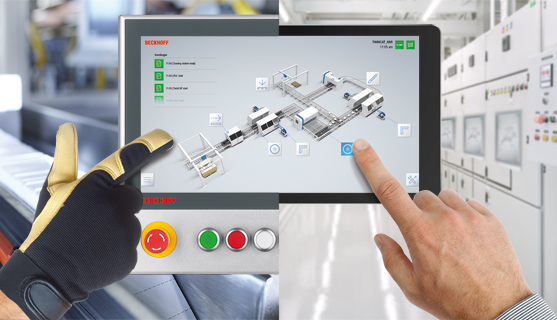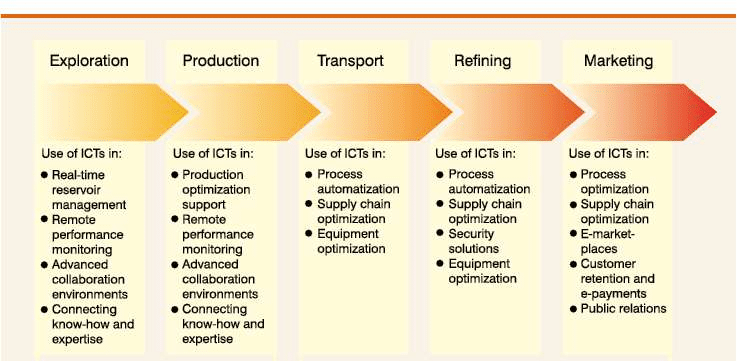

Where can ICT be employed in theoil and gas industry?
Itis important to mention that the oil and gas is majorly divided into threesector: the upstream, midstream and the downstream sector.
Thereare a lot of activities that go on in the oil and gas firm and these activitiesare either carried out in the upstream, midstream or downstream of the oil andgas sector. Whether an activity is located within the upstream, midstream anddownstream depends on where the activity is located in the supply chain of theoil industry.
The upstream sector
Theupstream is the sector in charge of exploration and production of crude oil popularlyknown as (E&P) in the oil industry. The activities under this sectorincludes all exploration activities like searching for, recovering andproduction of natural gas from either underground field or underwater field.The operational activities of companies under this sector therefore is tosearch out potential oil fields, and drill crude oil from oil them and otherexisting oil fields.
Use of ICT in the upstream sector
Themajor concern of both government and companies operating within the upstreamsector has is always how to increase crude oil reserve to keep up with thegrowing demand for petroleum products. This pushes oil companies to investheavily on research and development to be able to come up with better ways to increasecrude oil production and recovery. ICT in this sector has solved this problemto a large extent by providing advanced technologies which help oil companies tohave a real time view of oil wells which has in turn increased oil recovery. Byproviding more advanced data collection tools, companies in this sector areable to gather enough data about oil wells which guides them in making decisionon oil recovery and production.
Theuse of ICT in the upstream sector is shown in the development of Smart Field by shell oil multinational.A Smart Field is an oil well remote controlled and operated on a constantbasis using the interpretation of near real time data captured by sensors thatare installed within oil wells and obtaining information about various physicaland chemical parameters of the oil well.
How does it work?

Oilfield are connected to ICT network through the internet and can be monitoredand viewed anytime from any part of the country by the authorised persons. Oilwells, pumps and pipelines are interconnected with IP address which oilcompanies use to monitor changes in the oil field. Before the introduction ofsmart fields, communication among the many units of the sector was very poor anddifficult which made every unit to almost work separately. But the introduction of smart fields powered by ICTbridges this communication gap.Companies install smart technologies that help them to remote control theirdifferent oil wells without needing to be in the field physically. Forinstance, the use of SCADA an industrial computer system made up of humanmachine interface, supervisory computer system, Remote terminal units,programmable logic controller and other communication infrastructure helpscompanies to control and oversea multiple oil sites from a remote area or a fardistance. SCADA system helps oil companies in decision making by makinginformation gathering easy and quick.
The midstream sector
The midstreamsector serves as the connector between the upstream and downstream. Thissector handles every activity that has to do with getting the crude oilproduced within the upstream to the final sector (Downstream) for the finish work.It handles moving the extracted crude oil and natural gas to the downstream forthe final processing. The activities under this sector includes: oiltransportation & Gas transmission, derivative processing/production,transporting crude oil through pipeline, rail, barge, oil tanker etc. to thedownstream for marketing and distribution. The midstream sector is alsoinvolved in transporting the finished product to the distributors.
The downstream sector
Thedownstream handles the refining, marketing and distribution of refined crudeoil and natural gas from the upstream. The downstream sector is also involvedin marketing, and distribution of refined petroleum products. By this, oilfirms operating in this sector refine and distribute the final product to themiddle men oil markers who in turn sells to the retailers. Thus the majoractivities of companies within the downstream sector is to refine, sale, marketand store petroleum products.
Application of ICT in the midstreamand downstream sector
Allthese activities mentioned under the midstream and downstream can be done moreeffectively and efficiently by employing ICTs. ICT enables oil companies underthis sector to gather, store and manipulate data on crude-oil prices,inventory, delivery costs refining and distribution of end petroleum products.The figure below summarises the use of ICTs in the oil and gas sector:

What is the advantages of ICT inthe oil and gas sector?
Reduce costs
Oiland gas sector deals a whole lot with data; the industry almost survive on dataand information. It spends a huge sum of money in gathering information throughthe traditional method .However, with the application of ICTs in the oil andgas sector the cost of traditional data handling is reduced to the barestminimum. For instance, cloud computing enables oil industries to generate,store and disseminate information at a very lower cost. With cloud computingthe cost of installing hardware to handle data is reduced since it onlyrequires simple IT gadgets like I-pad, Laptop, desktop etc. This saves the hugemoney oil industries often spend on installed hardware that manage their data.It also saves collaboration and communication cost as the different units ofthe oil industry are interdependent.
Improve and increaseProductivity
ICTin oil industry enables real time monitoring and remote control of oilindustries to promote efficiency in oil production. It also enables andpromotes collection of accurate data within a short period of time which helpsin taking decision concerning development and recovery of oil fields. The wholeessence of developing smart oil field is to increase productivity in the upstreamsector.
Real timeinformation gathering and communication
Dataand information communication is the life wire of oil and gas industry and thisis where ICT has come to play an important role. By connecting to the internetand installing several applications and software, oil companies are able tomaintain effective in-house and external communication which helps them oilproduction and company management
Almostevery oil company in the oil industry has employed ICTs in their management andadministration process.This is why you should endeavor to acquire at leastbasic computer skill if you have eye for job in the oil and gas industry.
Thereis always an upsurge in the number of applicants looking for job in the oil andgas sector but most of them have little or no idea of computer operation andthis is why you may not have gotten that job even though you have applied manytimes.
Youcan increase your chances of getting that job by enrolling in ICT training .Step up your value by getting the most important 21st century skillwhich is ICT.
Get weekly updates about our product on your email. No spam, guaranteed! ✌️